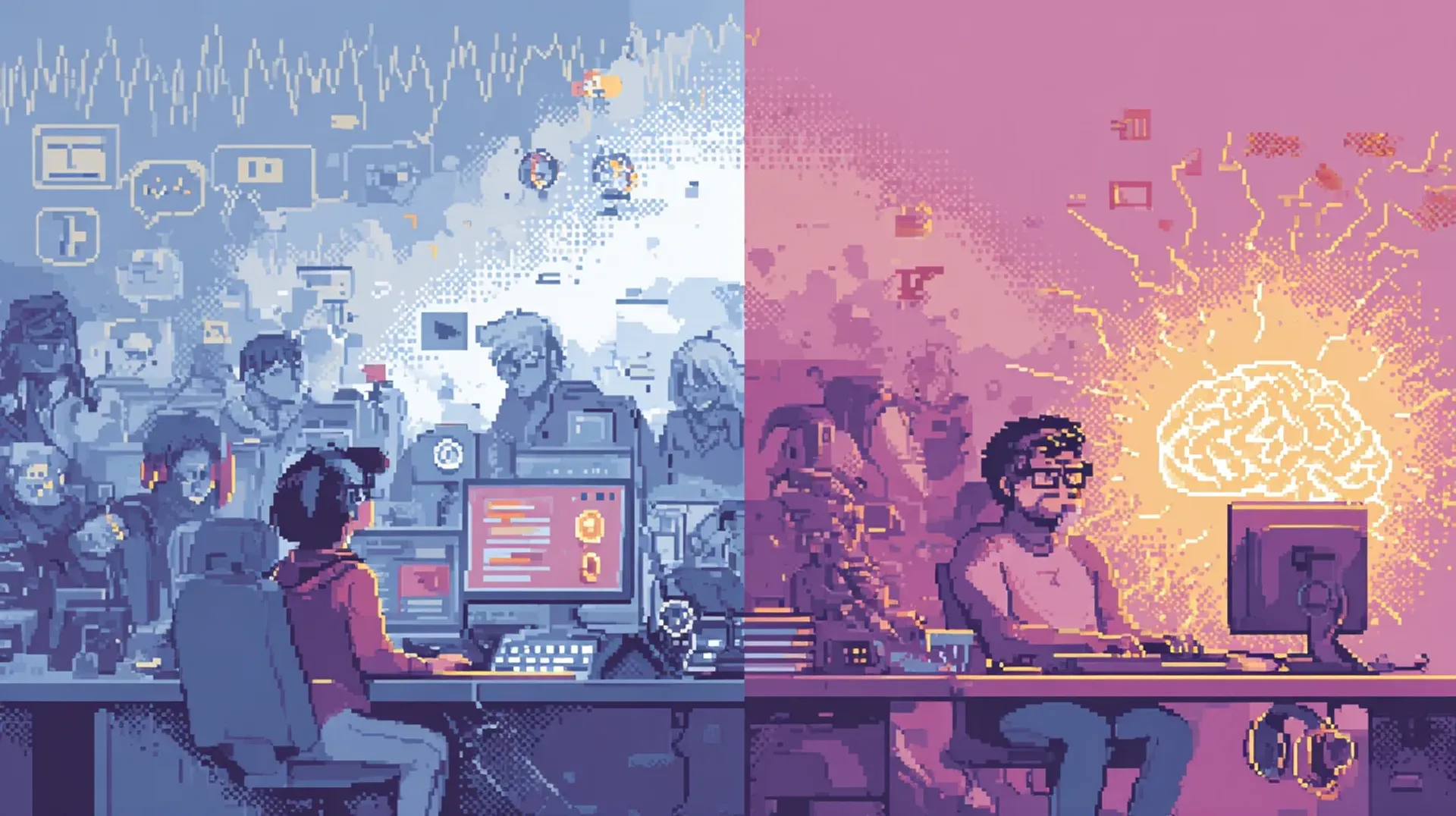I led a team of engineers and creatives while serving as fractional CTO to dozens of startup founders. Most were “alpha” personalities who thrived on rapid-fire brainstorming and impromptu whiteboard sessions.
I’m not that person.
I’m an introvert. Acting extroverted in those settings drained me. Open-plan offices with constant interruptions, all-hands meetings, and the expectation to be “on” for 10 hours a day - it was exhausting. I needed introspection to recharge, but the environment rarely allowed it.
That was over a decade ago. Everything has changed.
The Old World Problem
The tech industry has long operated on an extrovert ideal. Open-plan offices were supposed to encourage collaboration. Pair programming was mandatory. Speaking up in meetings was how you got promoted. Visibility mattered more than the quality of your work.
For introverts - who make up roughly half the workforce - this was a nightmare.
- Open offices: Constant stimuli, conversations, people appearing to “pick your brain”
- Pair programming pressure: All-day verbal interaction when you need silence to think
- Promotion bias: Extroverts get promoted because they’ve learned to sell themselves, not because they produce better work
- Energy drain: Being on medium-strength social awareness for 8-10 hours straight
— Steve WozniakMost inventors and engineers I’ve met are like me. They’re shy and live in their heads. They work best when they’re alone.
The irony is that building requires deep focus. You need to get “into the zone” to do your best work. Yet the industry kept pushing environments that made this impossible.
The Remote Work Shift
The pandemic changed everything.
Before 2020, remote work was rare. Introverts were forced into noisy open-plan offices. Now, studies show that remote tech workers are just as productive - sometimes more - due to fewer interruptions and the ability to control their environment.
For me, remote work meant I could finally:
- Work during my most productive hours without interruption
- Think through responses before speaking
- Avoid the constant drain of office chit-chat
- Recharge between meetings
This isn’t about avoiding people. It’s about controlling when and how I engage so I can bring my best thinking to the table.
Modern Tools That Empower Introverts
The real transformation isn’t just remote work - it’s the toolkit that came with it.
Async Communication
Slack, Loom, and documentation-first cultures favor introverts. Instead of dominating meetings, you can:
- Compose thoughtful responses at your own pace
- Record video explanations instead of scheduling calls
- Let ideas speak for themselves in written form
Research shows introverts excel at written communication. Async tools finally let us use that strength.
Most meetings should be emails, most emails should be Slack messages, and most Slacks should be Looms.
AI Assistants as Mission Control
The real benefit of tools like Claude Code isn’t just code completion - it’s staying in flow.
I use AI assistants to:
- Organize my thoughts before communicating
- Research without context-switching
- Work through ideas before sharing them
- Integrate with platforms across the business seamlessly
For introverts, this is transformative. Instead of interrupting someone to ask a question or jumping into Slack mid-thought, I can work through problems completely, then communicate deliberately.
It’s my mission control - thoughts stay organized and centralized, and I control exactly how, when, and where I engage with others. The AI handles the friction so I can stay focused.
Documentation-First Culture
Amazon’s six-pager approach fascinates me. Meetings start with 20 minutes of silent reading. Written narratives have 7-9x the information density of PowerPoints. People read 3x faster than presenters talk.
This rewards:
- Clear thinking over charisma
- Depth of analysis over volume of talk
- Preparation over improvisation
For introverts, this is our natural mode. We can finally compete on the quality of our ideas rather than how loudly we present them.
One-on-Ones: The Introvert Leadership Superpower
Here’s where things get interesting for tech leaders.
Research shows that introverted and extroverted leaders are equally effective - but with different types of teams. Extroverts do better with passive teams needing direction. Introverts excel with proactive teams who voice their own ideas.
— Adam Grant, Wharton professorIntroverted leaders have a tendency to listen more carefully and be more receptive to group ideas. Their teams feel more valued and more motivated to work harder.
Back then, I was trying to lead like an extrovert. All-hands meetings, loud brainstorms, constant availability. It worked, but it burned me out.
Now I lead with one-on-ones, async updates, and written proposals. The results are better and I have energy left at the end of the day.
Deep Thinking as Competitive Advantage
Introverts value quiet time for strategic thinking and planning. In a world of constant distraction, this is increasingly rare.
When everyone else is in back-to-back meetings, you’re:
- Analyzing problems others haven’t noticed
- Thinking through second-order effects
- Finding solutions that require sustained focus
The best technical decisions I’ve made came from hours of uninterrupted thinking - something that was nearly impossible in open-plan offices but is the default in remote work.
Quiet Confidence
I’m not advocating for introverts to avoid leadership or hide from collaboration. The opposite: modern tools finally let us lead in ways that match how we actually think.
This isn’t introversion as weakness to overcome. It’s introversion as a different approach that produces different - often better - results:
- Deep relationships over broad networks
- Thoughtful analysis over quick reactions
- Written clarity over verbal charisma
- One-on-one mentoring over all-hands broadcasts
A 2006 USA Today survey found 65% of senior executives say introversion is a “liability” for leaders. The data says otherwise. Some of the most successful tech leaders - Gates, Zuckerberg, Cook, Woz, Pichai - are introverts.
What Changed for Me
Now, working remotely with small teams, async communication, AI assistants, and one-on-one catchups - I’m more impactful than I’ve ever been. Not despite being an introvert, but because I finally have tools that match how I think.
If you’re an introvert in tech feeling drained by extroverted workplace norms, know this: the tools exist now. Remote work, async communication, AI assistants, documentation-first cultures - they’re all designed for how we actually work best.
The quiet advantage is real. You just need the right environment to use it.



